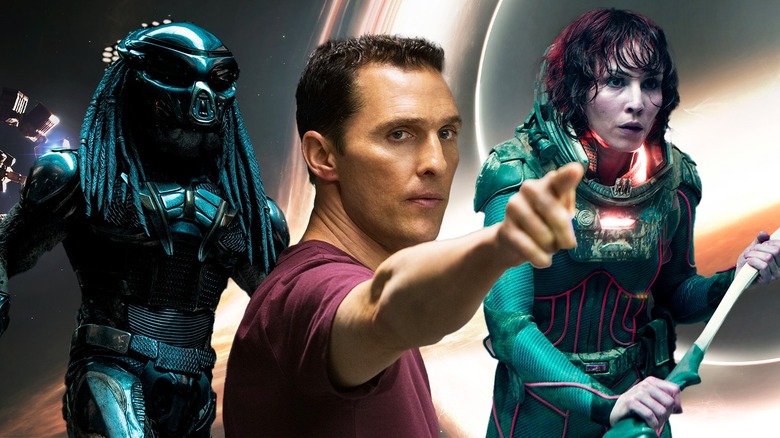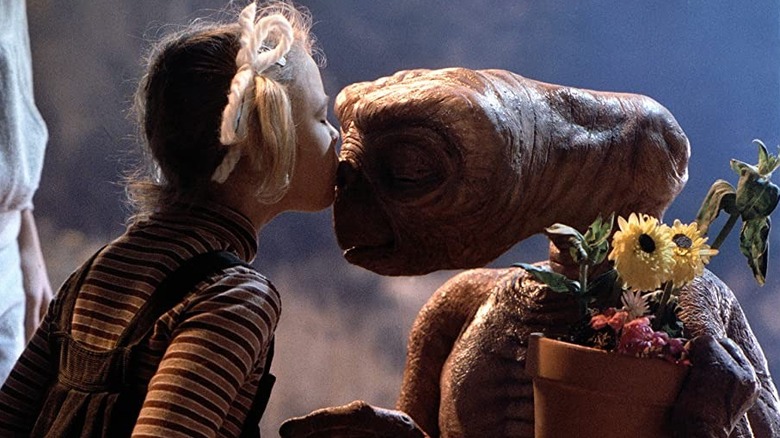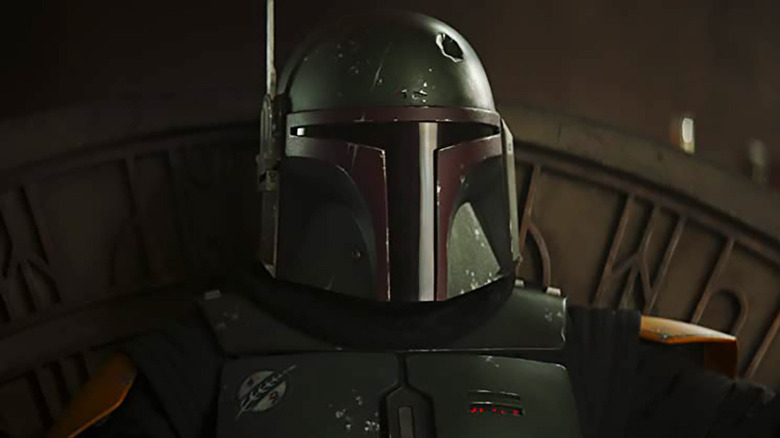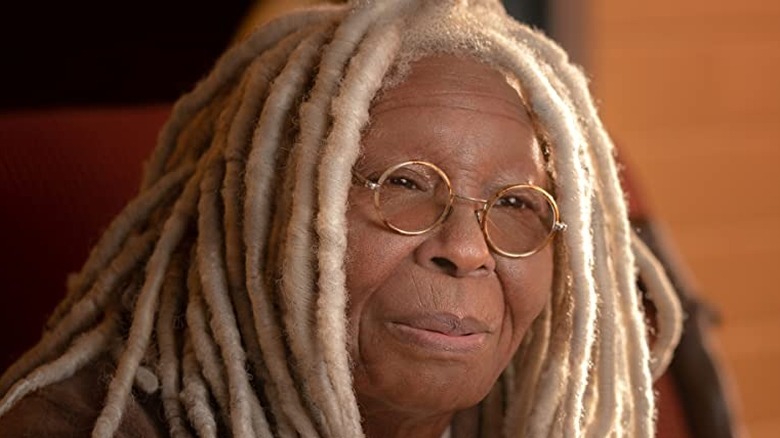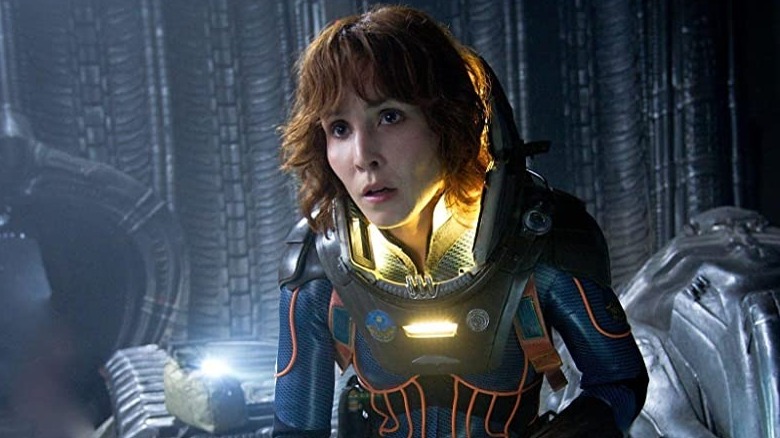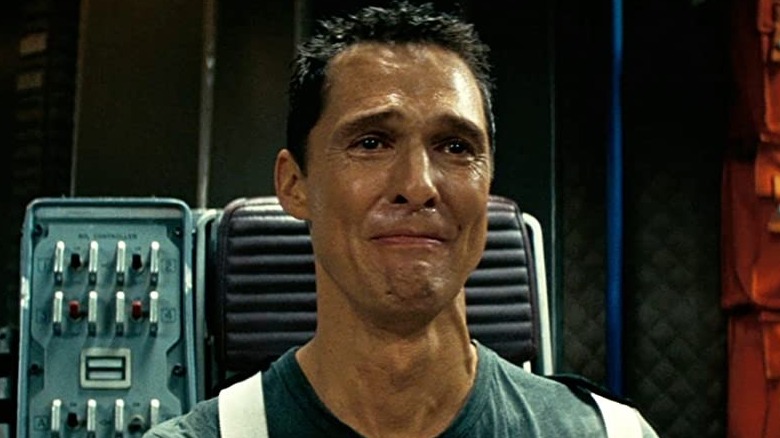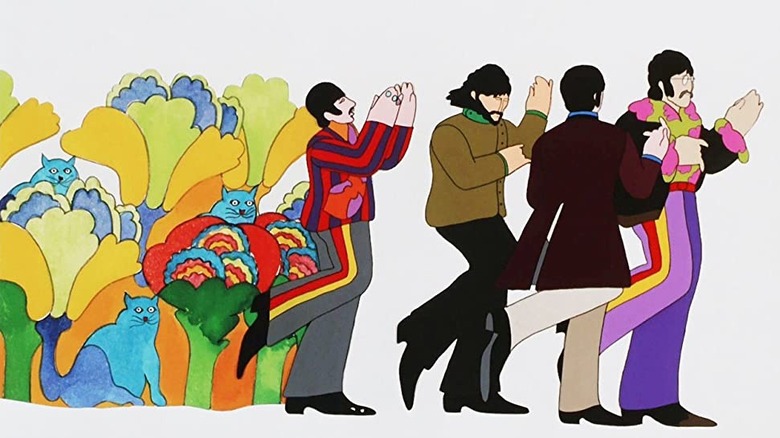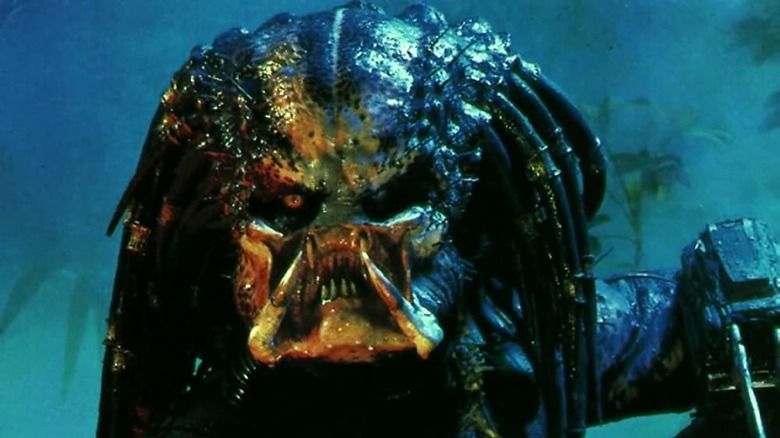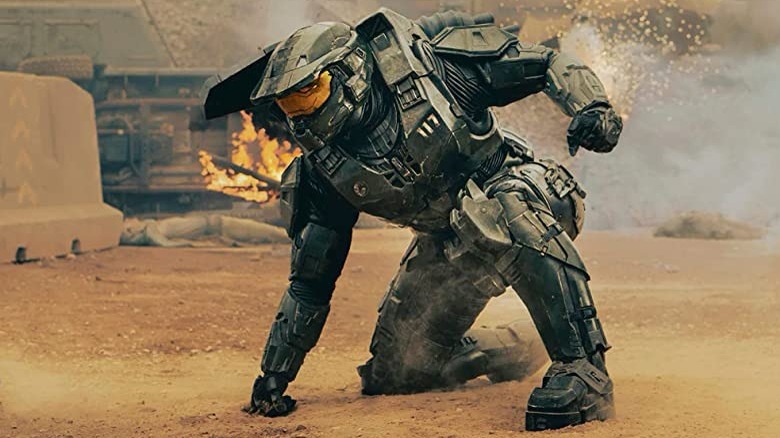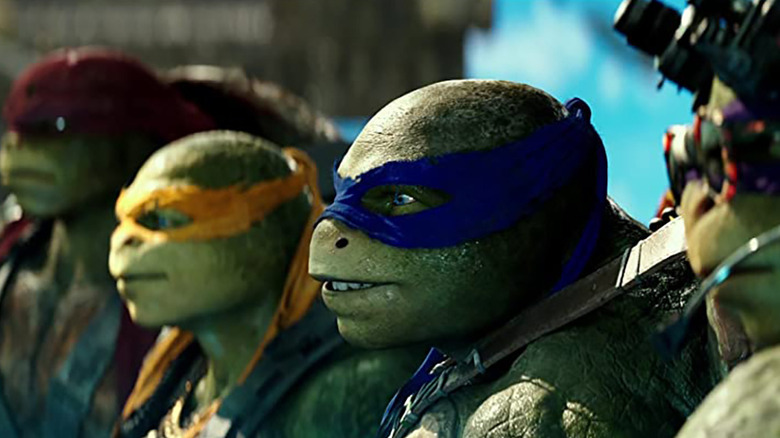Sci-Fi Movies Canceled For The Most Bizarre Reasons
Hardcore cinephiles' love of film comes with a cost: They simply can't get too attached to projects before they're firmly, officially, and visibly released. Potential movies can die for any reason, including circumstances like the death of cast or crew, production snarls, or world events. Sometimes, movies are scrapped for what seems to be no reason at all. No one and nothing is safe, either: Even the dual juggernauts of Disney and Marvel have canned their fair share of movies at various stages of creation.
Science fiction often seems to have it worse than any other genre in this regard, at least from a fan perspective. These high-concept, big-budget, effects-heavy undertakings are especially susceptible to the studio chopping block. Because so much effort, money, and time goes into the creation of sci-fi stories for the big screen, production companies are pre-incentivized to kill them at the first hint of trouble to save a buck. Sometimes, this even leads to cancelation of movies on the eve of their release.
It's no surprise, then, that sci-fi history is littered with the bones of fledgling films and the ghosts of movies that might have been. What is surprising, however, is how strange and unbelievable some of these cancelation stories really are. We've dug up some of the strangest, and we're here to spill the details. These are the sci-fi movies that were canceled for the most bizarre reasons.
Spielberg's Night Skies died when it made a friend cry
Believe it or not, there was a time when Steven Spielberg wasn't widely considered to be one of the most iconic filmmakers in history. It wasn't until his one-two punch of "Jaws" and "Close Encounters of the Third Kind" (in 1975 and 1977 respectively) that the director found breakthrough success. In the early '80s, he went about creating his next two-hit combo. While filming "Raiders of the Lost Ark" in 1980, Spielberg sought to repeat his "Close Encounters" success by commissioning a script for another alien movie. The script, titled "Night Skies," was a dark, frightening tale of home invasion by murderous aliens.
Spielberg balked at the unsettling tone. Because he was workshopping "Night Skies" on the "Raiders of the Lost Ark" set, he asked screenwriter Melissa Mathison for input. Like Spielberg, Mathison didn't find the horror elements compelling, but did latch on to one aspect: A subplot featuring a child-alien friendship. This actually brought Mathison to tears, and together, she and Spielberg began reworking the movie into a more family-friendly tale.
In just two short months, Mathison rewrote "Night Skies" almost completely, killing the Spielberg-led alien home-invasion horror forever. On the bright side, its basic premise of a family terrorized by inhuman invaders did help inspire Spielberg's "Poltergeist." Moreover, the new film that rose from the retooled "Night Skies" script was the all-time classic "E.T. the Extra-Terrestrial."
Boba Fett was killed by Josh Trank's behavior
We're living through a golden age for "Star Wars" fans, what with Disney bankrolling and releasing new movies and series every year. Yet even with the support of the unrivaled goliath that is Disney and the almost unparalleled brand loyalty of "Star Wars" fandom, new movies in the franchise still get canceled. One of the most notable, both for its rumored main character and the talent tapped to make it happen, is the scrapped 2018 stand-alone film that was intended to be directed by Josh Trank and heavily rumored to be "Star Wars Anthology: Boba Fett."
As confirmed by Bob Iger, plans for the film began in 2013, just months after Disney's acquisition of Lucasfilm. The project was to be directed by Trank, but he departed it suddenly in 2015, leaving the movie in development hell. Even James Mangold signing on to replace Trank and revive production couldn't give the Boba Fett movie back its original buzz.
According to The Hollywood Reporter, numerous sources alleged that Trank's exit from the project was due to his poor behavior on the set of the 2015 "Fantastic Four" reboot. Allegations by multiple members of the movie's crew include social isolation, aggression, micro-management, and even legal issues. All of this seemingly culminated in the termination of the director's relationship with Lucasfilm.
Stephen King's The Stand was canceled due to Stephen King
Horror legend Stephen King has penned a metric ton of horror stories. Predictably, he also has a metric ton of movies to his name. Since his debut in the early 1970s, King has seemed like an unstoppable juggernaut in the world of horror. For the most part, that's been true. However, there are a few points at which the King train has slowed down — the flop that was 2017's "The Dark Tower," for one — and even been forced into a full stop. Oddly enough, one of the longest stops came while trying to adapt his beloved dystopian epic "The Stand" — and it came at the hands of King himself.
The failure of a movie based on "The Stand" to see release is surprising. The fact that horror legend George Romero spent years trying to release it makes it outright shocking. As Romero told SciFiNow, "I worked on 'The Stand' for two years ... [King] didn't want it to be done for TV because he said that would castrate it. But, as a theatrical feature, he insisted that it be three hours plus in length and no one wanted to do that. So we never got a deal and it sat on the shelf forever." There you have it: According to Romero, King's refusal to adapt the movie that existed in his head into a series, or even a lower-budget movie, is what killed "The Stand." In what was likely a frustrating development for Romero, King eventually did allow "The Stand" to become a miniseries, in both 1994 and 2020.
Mountains Of Madness was felled by Prometheus
If you tried to imagine the most surprising dream project to end up getting canceled before completion, you might very well dream up the notion of genre legend Guillermo del Toro adapting the iconic H. P. Lovecraft novella "At the Mountains of Madness." Talk about a match made in heaven, right? But in fact, this movie was almost very real. Del Toro did indeed try to make it, only to find it canceled for the strangest of reasons: the 2012 Ridley Scott "Alien" prequel, "Prometheus."
Adapting "At the Mountains of Madness" was Del Toro's dream project, and he tried to get it made from 1993 to 2012 — just shy of 20 years. The celebrated director discussed the matter on a forum dedicated to his work, writing, "With the budget and place Ridley Scott occupied [with 'Prometheus'], I assumed the [Greek] metaphor alluded at the creation aspects of the HPL book ... this will probably mark a long pause — if not the demise — of ATMOM." When a fan asked why "At the Mountains of Madness" couldn't survive, or even thrive, alongside Scott's film, Del Toro wrote back, "Same premise. Scenes that would be almost identical." Unfortunately for fans of Del Toro and Lovecraft, the director was unwilling to create an "At the Mountains of Madness" movie with even a hint of unoriginality to it.
Interstellar killed The Black Hole
Christopher Nolan's epic "Interstellar," a sweeping saga about humanity's indomitability and the enduring power of love, was released in 2014 to critical acclaim and solid box office success. The film is especially distinguished by its an exceptional attention to scientific accuracy, as ensured by Nobel-winning physicist Kip Thorne, who acted as the film's scientific consultant and executive producer. For all the praise and esteem that can be heaped upon this movie, however, it must also be noted that it accomplished another, much more dubious (and ironic) feat: "Interstellar" killed "The Black Hole."
The story behind this slaughter starts with an impressive collaboration between director Joseph Kosinski, now best known for his 2022 smash hit "Top Gun: Maverick," and screenwriter Jon Spaihts, one of the writers of 2021's "Dune." The pair joined forces to remake the 1979 Disney sci-fi adventure "The Black Hole," which was likely meant for a mid-2010s release. The problem with that window was "Interstellar," which Disney felt was too similar in concept to "The Black Hole." Thus, they nixed the latter project. Kosinski remains interested in making "The Black Hole" happen in a period with less competition, however. Spaihts confirmed these events and the continuing interest in "The Black Hole" to /Film, though in a more nebulous way. "[Disney] already [has] multiple big space epics going," he remarked, "so I don't know how or whether it'll find its way to light of day, but I sure wrote a heck of a movie and was thrilled to do it."
Yellow Submarine was canceled because of creepy CG
The Beatles are perhaps the most legendary band of all time. During their heyday, they were popular enough to produce and star in five movies, the majority of which were released to great acclaim. Their sole animated film, the 1968 sci-fi-fantasy mind-bender "Yellow Submarine" remains perhaps their most well-known film, if only for being so utterly strange. The trippy adventure flick endured well enough for the one and only Robert Zemeckis to begin working on a reboot in 2009 – only for it to be canceled by Disney before production could enter full swing. The company's surprising (but ultimately understandable) reason behind the cancelation? Zemeckis planned to make the film using the same motion-capture CG technology used on "A Christmas Carol" and "Mars Needs Moms," which Disney considered off-putting failures.
It's true that "A Christmas Carol" was not as big a success as Disney hoped, only grossing $325 million against its massive $200 million budget. The forgettable "Mars Needs Moms" fared much worse, bringing in less than a third of its $150 million budget. Based on financial trends alone, the decision to cancel another expensive project made with uncanny valley graphics makes sense. But even if those movies had done better, this take on "Yellow Submarine" might not have survived. Simply put, too many people in powerful positions find the unique visuals unsettling.
The first Predator was defeated by Jean-Claude Van Damme
Here's a sentence that just sounds wrong when said aloud: Jean-Claude Van Damme dons his infamous insect suit to play the titular, high-kicking alien in 1987's "Predator." And yet, for a time, this statement was 100% true, as Van Damme was the first actor to portray the Predator during the filming of the original movie. Perhaps just as strangely, the suit he wore had not yet become the multi-mouthed, dreadlocked beefcake we've come to know and love. Instead, it looked more like a tall, thin, hairless insect, in keeping with its original acrobatic nature.
The role of the Predator was one of Van Damme's first, which he scored by repeatedly hounding the film's casting director with showcases of his martial arts and acrobatics. As soon as he landed the role, however, his physical stunts went from being assets to liabilities. This is one of the main reasons the original, stealthy, Van Damme "Predator" ultimately died. As The Hollywood Reporter revealed, Van Damme detested the suit almost immediately. The actor complained, "It was boiling hot ... It was a disgusting outfit." Even worse, he cited repeated safety concerns while wearing it, saying of one stunt, "When [producer Joel Silver] asked me to jump, I knew it was gonna be a bad one. I said, 'This is impossible, Joel. I think we're gonna have a problem' ... the guy who did my stunt, something bad happened to him... And then they stopped the film, and they did a new, more safe, outfit."
Peter Jackson's Halo was too big not to fail
In our modern age of video games, you'd be hard-pressed to identify a more meteoric rise in popularity and acclaim than the one enjoyed by the "Halo" franchise. The sci-fi shooter series became the new measuring stick of its genre, and spawned its own media empire.
With all the property's success, it seems like it would be almost impossible for a movie starring "Halo" protagonist Master Chief to fail at the box office. It follows, then, that any decent filmmaker pitching the movie to any decent studio should be an easy greenlight. Now add Peter Jackson into the mix, and offer it to every studio on the block. That should be the easiest and fastest greenlight in history, right? Wrong. Such success seems like it should be true, and yet, this wasn't the case when Microsoft offered a "Halo" movie with Jackson as executive producer to studios all around Hollywood. Every single one of them passed on the movie, and sources strongly agree that the uber-powerful, uber-particular Microsoft was to blame.
Despite Jackson's involvement, a young Neill Blomkamp attached to direct, and a pre-written script from "28 Days Later" scribe Alex Garland, Microsoft simply had no clue how to sell the movie to Hollywood. They offered the scripts to studio heads accompanied by stringent, unwavering demands and the most minimal time frame in which to make decisions. Instead of focusing on fostering mutually profitable deals with movie studios, Microsoft spent much of its energy on its showy marketing scheme — scripts were hand-delivered to studio heads by fully-suited "Halo" Spartans — which ultimately proved unprofitable.
Teenage Alien Ninja Turtles canceled due to universal hatred
If you take a step back and analyze the "Teenage Mutant Ninja Turtles" franchise for even a moment, you invariably realize that the entire concept is bonkers, to put it mildly. Despite its strangeness — or likely because of it — millions of fans are quite attached to the teenage terrapins and their trademark blend of fun-loving quips and brooding martial arts vigilantism. That's why any intent on the part of a filmmaker to alter the general TMNT vibe is guaranteed to result in blowback.
Michael Bay learned this lesson the hard way in 2012, when he publicly proclaimed his upcoming reboot movie would feature a new set of turtles hailing from an alien race. Even worse, just a few months after his announcement, a draft of the new TMNT script leaked online, which not only confirmed the alien retcon, but also drummed up new fears that the story was just plain awful.
Peter Laird, one of the franchise's two co-creators, didn't mince words in a post on his official blog, writing, "the script that I read is so fundamentally flawed, and — more to the point — so NOT a Teenage Mutant Ninja Turtles movie ... the thing should just be tossed out, deliberately forgotten, and the process of generating a new script — really a new outline, then treatment, then script — should be started again." A wave of fans voiced their agreement through various outlets, and ultimately, the entire script and concept were tossed. This forced Bay to publicly walk back his promise to make our favorite fearsome foursome into aliens.
